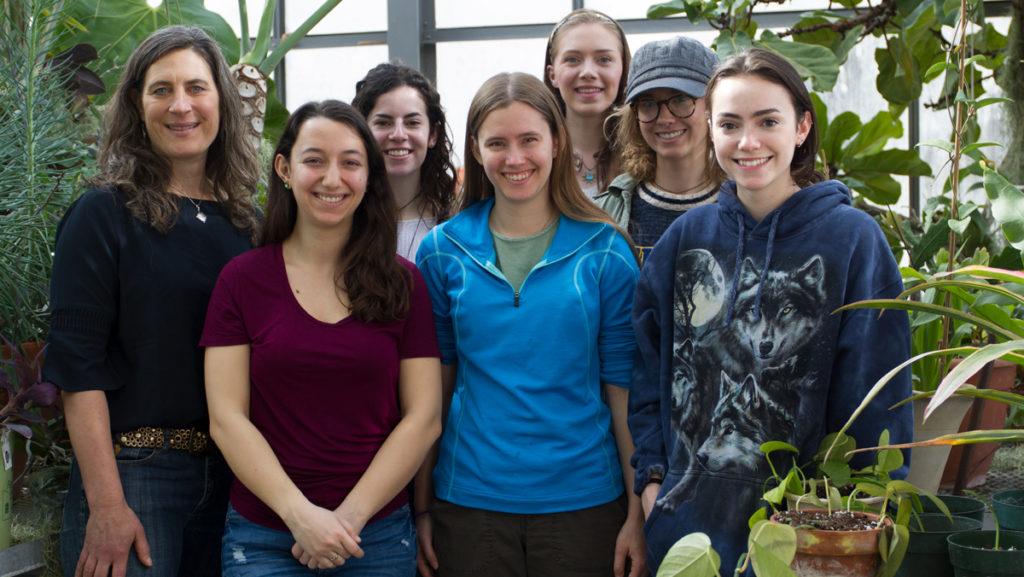Ithaca College’s student-run hydroponics and aquaponics systems are receiving materials to improve and expand within the next few months.
Paula Turkon, assistant professor in the Department of Environmental Studies and Sciences, oversees seven undergraduate student researchers who maintain the hydroponics and aquaponics systems in the Center for Natural Sciences and the hydroponics system in Terrace Dining Hall. Hydroponics is a method of cultivating plants through the nutritious water beneath them. Aquaponics incorporates fish into the hydroponics system.
Turkon said hydroponics is an efficient method because the plants receive nutrients directly from the water. The traditional medium, soil, takes longer to distribute nutrients to the plants.
Materials have been ordered to expand the systems into the greenhouse from the growing room in CNS, Turkon said. The greenhouse allows for more natural light and space for additional crops, she said. However, using an uncontrolled environment generates more challenges. She said it is necessary to regulate the temperature in the greenhouse because the tilapia and plants demand temperatures of about 85 degrees.
To deal with these complications, Turkon plans to grow cold–weather plants in the winter and warm–weather plants in the summer.
Turkon also said the team faces challenges with aquaponics because it has to accommodate the fish. Although aquaponics is more natural than hydroponics because the waste the fish produce provides nutrients for the plants, aquaponics is not completely sustainable because the fish in the system are fed fish meal, Turkon said.
Turkon and the project team have been researching more sustainable and locally available food for the fish as a way to improve the system.
Turkon said bringing aquaponics to campus in the spring of 2013 was important to her because fresh produce could be made available to the campus year-round. The hydroponics system was installed the following semester.
“The overall benefit is to try to provide some local produce,” Turkon said. “It can’t get any more local than this.”
Junior Jennifer Skala manages the hydroponics system in Terrace Dining Hall in addition to tending to the systems in CNS.
“We use the system to demonstrate our alternative grow methods to the broader campus community and provide the kitchen with healthy and local herbs for use in their meals,” Skala said.
Because the water in the hydroponics cycle is renewable, the system can be beneficial to regions like New York state that have colder climates or areas that struggle with water shortages, Turkon said.
Turkon, who has experience performing archaeological research in Mesoamerica, was inspired by floating gardens called “chinampas.” Chinampas are a traditional Aztec agricultural method that requires a plot of fertile land to float on freshwater lakes.
“Aquaponics is actually a modern technological version of a prehistoric technology,” Turkon said. “It’s this continuous process that’s adding nutrients to the soil. The soil is supporting the plants and cleaning the water as well.”
Turkon learned about aquaponics from Miles Crettien ’09, who co-founded VertiCulture, an aquaponics farm in New York City. Turkon also received guidance from local aquaponics farmer Steven Austin in the system’s beginning stages.
Herbs grown in Terrace Dining Hall become ingredients for meals in the dining hall.
The hydroponics system allows chefs to garnish dishes with herbs from the garden, Jeff Scott, general manager of dining services on campus, said. The hydroponics system serves to educate both students dining at Terraces and the members of the project on sustainability.
“It’s a reminder of our commitment to sustainability,” Scott said.
Scott said that further expansion of the system has been discussed and that he is eager to hear proposals of agricultural methods from students.
Scott is seeking students who can implement innovative growing methods such as growing vertically or growing in the courtyards.
Integrating hydroponics and aquaponics systems on campus allows students to assist Turkon in the project and receive research credits. Senior Lauren Saylor became involved with the project as a freshman when Turkon introduced the project in her environmental seminar. In addition to maintaining the CNS system each week, Saylor is conducting independent research on pathogenic contamination in aquaponics and hydroponics systems.
“This system benefits the researchers most directly,” Saylor said. “I believe that this will educate the campus on sustainable food production — we do this already at Terraces to a small degree.”
Skala hopes to increase the productivity of the Terraces hydroponics system to produce more fresh food for the dining hall. In the future, Skala wants to continue researching innovative fertilizers and nutrient disorders in crops.
Sophomore Carmen Liberatore recently joined the team and said she is adjusting to the maintenance procedures that include cleaning the water filters, feeding the fish and pruning the plants.
“It’s such a niche interest, and it’s cool to have the chance to dig into it,” Liberatore said.








